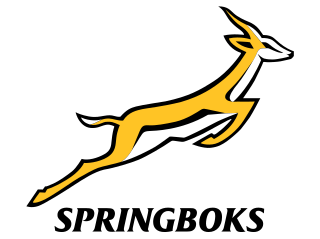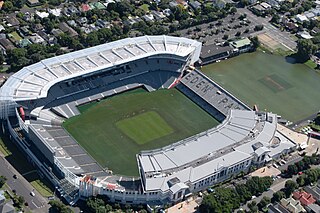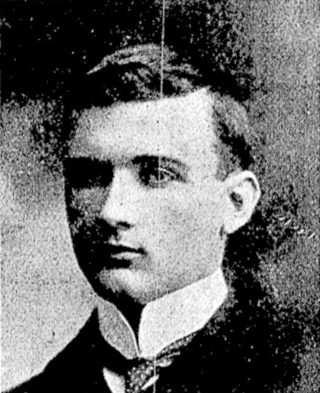Related Research Articles

The British & Irish Lions is a rugby union team selected from players eligible for the national teams of England, Ireland, Scotland, and Wales. The Lions are a test side and most often select players who have already played for their national team, although they can pick uncapped players who are eligible for any of the four unions. The team tours every four years, with these rotating between Australia, New Zealand and South Africa in order. The most recent test series, the 2021 series against South Africa, was won 2–1 by South Africa.

The New Zealand national rugby union team, commonly known as the All Blacks, represents New Zealand in men's international rugby union, which is considered the country's national sport. Famed for their international success, the All Blacks have often been regarded as one of the most successful sports teams in history.

The South Africa national rugby union team, commonly known as the Springboks, is the country's national team governed by the South African Rugby Union. The Springboks play in green and gold jerseys with white shorts, and their emblem is the Springbok, a native antelope and the national animal of South Africa. The team has represented South African Rugby Union in international rugby union since 30 July 1891, when they played their first test match against a British Isles touring team. Currently, the Springboks are the reigning World Champions, having won the World Cup a record four times. South Africa are the only team to have won half of the Rugby World Cups they have participated in, and are also the second nation to win the World Cup consecutively.

New Zealand Rugby (NZR) is the governing body of rugby union in New Zealand. It was founded in 1892 as the New Zealand Rugby Football Union (NZRFU), 12 years after the first provincial unions in New Zealand. In 1949 it became an affiliate to the International Rugby Football Board, now known as World Rugby, the governing body of rugby union for the world. It dropped the word "Football" from its name in 2006. The brand name New Zealand Rugby was adopted in 2013. Officially, it is an incorporated society with the name New Zealand Rugby Union Incorporated.

Eden Park is a sports venue in Auckland, New Zealand. It is located three kilometres southwest of the Auckland CBD, on the boundary between the suburbs of Mount Eden and Kingsland. The main stadium has a nominal capacity of 50,000, and is sometimes referred to as New Zealand's national stadium. The stadium is used primarily for rugby union in winter and cricket in summer, and has also hosted rugby league and association football matches, as well as concerts and cultural events. It is owned and operated by the Eden Park Trust Board, whose headquarters are located in the stadium.

FMG Stadium Waikato is a major sporting and cultural events venue in Hamilton, New Zealand, with a total capacity of 25,800. Four areas contribute to this capacity: The Brian Perry Stand holding 12,000, the WEL Networks Stand holding 8,000, the Goal Line Terrace holding 800 and the Greenzone can hold up to 5,000 people. The capacity can be extended, however, by temporarily adding 5,000 seats to the Goal Line Terrace area. The stadium, owned by the Hamilton City Council, regularly hosts two rugby union teams:
The All Blacks XV is the second national rugby union team of New Zealand, after the All Blacks. New Zealand's second national team has had numerous names in its history: Junior All Blacks, New Zealand XV, New Zealand A, New Zealand B, All Blacks XV.

Rugby union has been played in New Zealand since 1870 and is the most popular sport in the country as well as being the de facto national sport. In a 2023 survey, 75% of respondents said they followed the sport.
The Cavaliers was an unofficial New Zealand rugby union team which toured South Africa in 1986. Because of the Apartheid policies of the South African government, the official New Zealand Rugby Union tour scheduled for 1985 was cancelled, and the Cavaliers tour was very controversial in New Zealand.

The 1907–1908 New Zealand rugby tour of Australia and Great Britain was made by a group of New Zealand rugby footballers who played matches in Australia, Ceylon, England and Wales between 1907 and 1908. Most of the matches were played under the rules of the Northern Union, a sport that is today known as rugby league. As such, the team were the immediate predecessors of the New Zealand national rugby league team. The tour had a large role in establishing rugby league in both Australia and New Zealand, and also gave birth to international rugby league. The tour party has come to be known as the professional All Blacks or All Golds, although at the time they were commonly referred to as the All Blacks—a named popularised by the New Zealand rugby union team that toured the Northern Hemisphere in 1905.
The 1909–10 Northern Rugby Football Union season was the 15th season of rugby league football.

Harold Francis Rowe was a New Zealand rugby footballer who was part of the professional 1907–08 New Zealand rugby tour of Australia and Great Britain.
John Joseph Duggan was an English rugby union, and professional rugby league footballer who played in the 1940s and 1950s. He played club level rugby union (RU) for Wakefield RFC, as a wing, and representative level rugby league (RL) for Yorkshire, and at club level for Wakefield Trinity, as a wing.

The 1921 South Africa rugby union tour of Australia and New Zealand was the third tour made by the Springboks rugby team, and their first tour to Australia and New Zealand. South Africa played three Test matches against the All Blacks. The series was drawn 1–all, and the long-running controversy between the countries over the All Blacks' inclusion of Maori players began.
The 1920 New Zealand tour rugby to New South Wales was the ninth tour by the New Zealand national team to Australia. The three most important matches on the tour were played against the New South Wales selection, and the All Blacks won the 3 match series 3–0.
The 1924 New Zealand tour rugby to New South Wales was the 11th tour by the New Zealand national rugby union team to Australia.
The 1960 New Zealand rugby union tour of South Africa, was a series of rugby union matches played by the New Zealand national rugby union team in South Africa and Rhodesia.

Benjamin John Fawcett is an Australian wheelchair rugby player and member of the national wheelchair rugby team. He won a gold medal at the 2016 Rio Paralympics and a bronze medal at the 2024 Paris Paralympics.

Rugby union and apartheid had a complex and supportive relationship. From 1948 to 1994, international rugby relations with the country, and also the non-integrated nature of rugby within South Africa drew frequent controversy. South Africa remained a member of the International Rugby Board (IRB) throughout the apartheid era.
References
- ↑ Knight, Lindsay. "Kit Fawcett". New Zealand Rugby Union. Retrieved 31 January 2015.